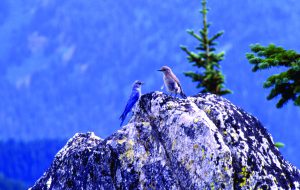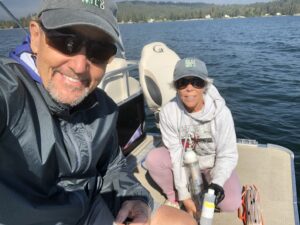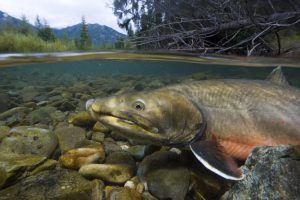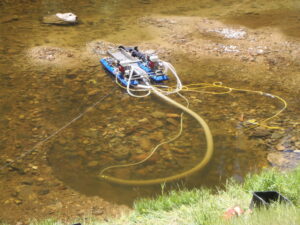Protecting the best of Idaho: 3 standout conservation wins in 2022
1. Expanding conservation work with the launch of a new Wildlife Program and North Idaho Lakes Advocacy Program
ICL has been an advocate for Idaho’s wildlife since its founding in 1973, but recognizing the increasing urgency and national attention surrounding threats to wildlife, especially related to habitat loss and climate change, this year ICL elevated our engagement in this arena with the launch of a new Wildlife Program. This new program reflects the growing threats to Idaho’s wildlife and its ability to persist in the face of rapid ecological change. ICL’s Wildlife Program is dedicated to protect and restore the full breadth of Idaho’s wildlife, and aims to build support for and dedicate funding toward the management of nongame animals (wildlife that is not classified as a game animal, or one to be hunted). In order to protect the full complement of wildlife in Idaho, and to protect all of Idaho’s biodiversity, we need to grow stronger advocacy for nongame animals. From the mountain bluebird to the monarch butterfly, nongame wildlife is wildlife that Idahoans know and love. To sign up for Wildlife Program email updates, click here.  From wildlife to water – ICL also celebrated the launch of a North Idaho Lakes Advocacy Program this spring. For eleven years, ICL’s North Idaho staff have worked to preserve the best of the panhandle. From public lands, to wildlife like grizzly bears and wolverines, to the incredible diversity of forests and other habitats, staff have collaborated with agencies and organizations to make sure that the things that make North Idaho special are preserved for now and future generations. In May, ICL’s North Idaho Lakes Advocacy program officially launched, aiming to protect the iconic waters of the panhandle including Lake Pend Oreille, Lake Coeur d’Alene, Priest Lake, the Kootenai River, and more from degradation and pollution. As more people move into the area, often drawn to the beauty of places like Lake Pend Oreille, it is more important than ever that we proactively put safeguards in place to protect these environments. ICL is excited to continue to partner with other organizations and community members doing this vital work to preserve these precious waterways. ICL is also grateful for our dedicated citizen scientist volunteers who participate in our Water Quality Monitoring Program (WQMP). Through the WQMP, volunteers collect water samples at sites across Lake Pend Oreille and the Pend Oreille River. Taking these measurements on a regular basis over many years helps us understand our local waterways and the overall health of our lake and river systems, so we can ensure our advocacy work helps keep these waterways swimmable, fishable, and drinkable for all.
From wildlife to water – ICL also celebrated the launch of a North Idaho Lakes Advocacy Program this spring. For eleven years, ICL’s North Idaho staff have worked to preserve the best of the panhandle. From public lands, to wildlife like grizzly bears and wolverines, to the incredible diversity of forests and other habitats, staff have collaborated with agencies and organizations to make sure that the things that make North Idaho special are preserved for now and future generations. In May, ICL’s North Idaho Lakes Advocacy program officially launched, aiming to protect the iconic waters of the panhandle including Lake Pend Oreille, Lake Coeur d’Alene, Priest Lake, the Kootenai River, and more from degradation and pollution. As more people move into the area, often drawn to the beauty of places like Lake Pend Oreille, it is more important than ever that we proactively put safeguards in place to protect these environments. ICL is excited to continue to partner with other organizations and community members doing this vital work to preserve these precious waterways. ICL is also grateful for our dedicated citizen scientist volunteers who participate in our Water Quality Monitoring Program (WQMP). Through the WQMP, volunteers collect water samples at sites across Lake Pend Oreille and the Pend Oreille River. Taking these measurements on a regular basis over many years helps us understand our local waterways and the overall health of our lake and river systems, so we can ensure our advocacy work helps keep these waterways swimmable, fishable, and drinkable for all.
2. Protecting clean water and critical bull trout habitat
Across the state, ICL had big wins for clean water this year, with notable victories to protect Lake Pend Oreille, the South Fork Clearwater River, and Chief Eagle Eye Creek.In North Idaho, in response to a lawsuit from ICL, the U.S. Army Corps of Engineers withdrew the permit for a harmful resort and marina development in Lake Pend Oreille, at the mouth of Trestle Creek. Trestle Creek is the most important spawning habitat for bull trout in the entire Pend Oreille Basin. Because of their listing as “threatened” under the Endangered Species Act, it is incredibly important to do everything we can to restore degraded bull trout habitat and protect habitat that is still in good condition. From bull trout in North Idaho to one of the southernmost populations of the endangered fish in Idaho, ICL sent the Forest Service back to the drawing boards for a project that would have harmed a critically imperiled bull trout population in Chief Eagle Eye Creek in the Boise National Forest. The Sage Hen Project will now get a fresh start, providing the chance to improve the project to help restore and sustain the cool, clear, free-flowing streams these fish need to survive.In the South Fork Clearwater River in North Central Idaho, an ICL lawsuit against a dredge miner resulted in a $150,000 fine for illegal mining in critical habitat for threatened salmon and steelhead. The fine, which was levied by federal Magistrate Judge Raymond Patricco against suction dredge miner Shannon Poe in a September 28 ruling, represents the largest Clean Water Act penalty ever against an individual in Idaho. ICL monitors suction dredge mining and has placed several minders on notice to encourage Clean Water Act compliance and to protect Idaho’s rivers and streams from pollution.
From bull trout in North Idaho to one of the southernmost populations of the endangered fish in Idaho, ICL sent the Forest Service back to the drawing boards for a project that would have harmed a critically imperiled bull trout population in Chief Eagle Eye Creek in the Boise National Forest. The Sage Hen Project will now get a fresh start, providing the chance to improve the project to help restore and sustain the cool, clear, free-flowing streams these fish need to survive.In the South Fork Clearwater River in North Central Idaho, an ICL lawsuit against a dredge miner resulted in a $150,000 fine for illegal mining in critical habitat for threatened salmon and steelhead. The fine, which was levied by federal Magistrate Judge Raymond Patricco against suction dredge miner Shannon Poe in a September 28 ruling, represents the largest Clean Water Act penalty ever against an individual in Idaho. ICL monitors suction dredge mining and has placed several minders on notice to encourage Clean Water Act compliance and to protect Idaho’s rivers and streams from pollution. Whether you’ve rafted down one of Idaho’s wild rivers, plunged into a pristine alpine lake, kayaked through a serene wetland, or watched for wildlife near the water – Idaho’s waterways are precious, and ICL will continue working to restore and protect them.
Whether you’ve rafted down one of Idaho’s wild rivers, plunged into a pristine alpine lake, kayaked through a serene wetland, or watched for wildlife near the water – Idaho’s waterways are precious, and ICL will continue working to restore and protect them.
3. Commitments to saving Idaho's endangered salmon
Earlier this year, ICL launched a grassroots organizing initiative based in Seattle, Washington – our Salmon Mobilization Team worked to build support for the breaching of the four lower Snake River dams to save wild Snake River salmon and steelhead from extinction. The 5-person team contacted over 20,000 people across the region, putting grassroots pressure on elected officials in Washington and Oregon. They also engaged new supporters through digital advocacy including phone calls, texting, emails, and social media. Officials were contacted over 107,000 times – urging them to take action. The Mobilization Team helped the regional coalition surpass their goal of 50,000 public comments on Washington Senator Patty Murray and Governor Jay Inslee’s draft report, which undertook the evaluation of the services provided by four dams on the lower Snake River. They considered the devastating effects of these dams on fish, the resulting harms to Northwest Tribes and other communities, and how these dams could be replaced. In August, they released a final report with recommendations on how to move forward. In these recommendations, Murray and Inslee dedicated themselves to replacing everything the dams provide so that breaching the dams and river restoration can be pursued in the future. They concluded that extinction of salmon is “categorically unacceptable” and that breaching the dams would be the most beneficial action possible for Snake River salmon. We look forward to continuing our efforts in pushing Murray and Inslee as well as other elected officials forward in taking meaningful next steps to save our wild salmon and steelhead.These wins would not have been possible without a community of partners, experts, mobilizers, and members. Thank you for taking part in this critical work to create a prosperous, sustainable future for all Idahoans.If you would like to renew your membership or become a member to financially sustain the work of ICL, please click the button below. We appreciate your support!
The Mobilization Team helped the regional coalition surpass their goal of 50,000 public comments on Washington Senator Patty Murray and Governor Jay Inslee’s draft report, which undertook the evaluation of the services provided by four dams on the lower Snake River. They considered the devastating effects of these dams on fish, the resulting harms to Northwest Tribes and other communities, and how these dams could be replaced. In August, they released a final report with recommendations on how to move forward. In these recommendations, Murray and Inslee dedicated themselves to replacing everything the dams provide so that breaching the dams and river restoration can be pursued in the future. They concluded that extinction of salmon is “categorically unacceptable” and that breaching the dams would be the most beneficial action possible for Snake River salmon. We look forward to continuing our efforts in pushing Murray and Inslee as well as other elected officials forward in taking meaningful next steps to save our wild salmon and steelhead.These wins would not have been possible without a community of partners, experts, mobilizers, and members. Thank you for taking part in this critical work to create a prosperous, sustainable future for all Idahoans.If you would like to renew your membership or become a member to financially sustain the work of ICL, please click the button below. We appreciate your support!

